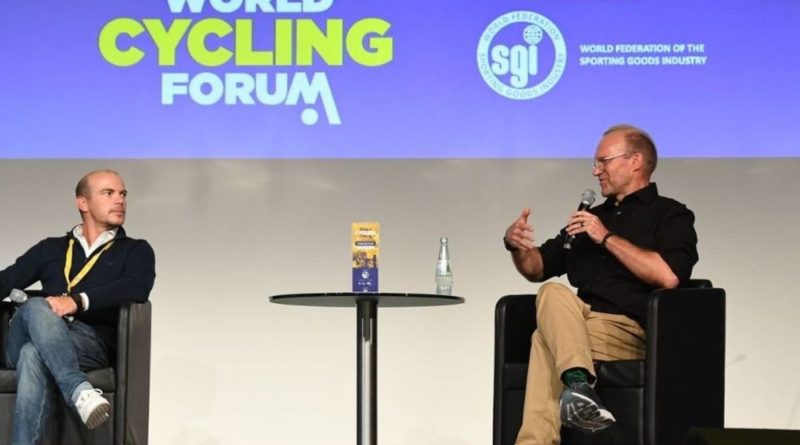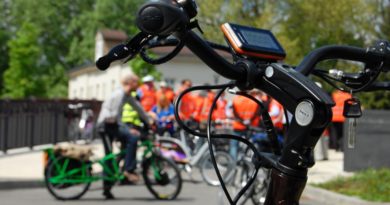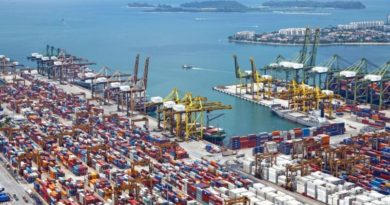World Cycling Forum speculates on future of bicycle industry
Held recently at the IAA Mobility show for the first time the World Cycling Forum took time to address the direction of the bike industry from manufacturing to the methods via which bikes arrive with the consumer.
A line-up of expert speakers addressed the business opportunities in the coming year which came to forefront during the pandemic, including:
- * The development of the online bicycle marketplace.
- * How to adapt to a developing retail environment?
- * Changing consumer behaviour as a result of Covid-19 restrictions.
- * Overview of governmental initiatives to aid and develop cycling.
- * Where are new and potential markets for the bicycle industry?
Future proofing the bike industry
“How do we make sure the bicycle industry is ready for emerging markets?” asked Raymond Gense, Director of Public Affairs Pon Holdings to the audience of the World Cycling Forum 2021.
“Nobody knows whether the projected sales of 30 million bicycles in Europe by 2030 is realistic. What I do know is that this industry needs more investments and support from Brussels. On a European level we have to compete with the automotive industry. The bicycle industry has one big competitive advantage: we create jobs while the car industry only fires people. And our industry is very innovative; e-Bikes come with many technologies known from the car industry or will soon have it. The world of mobility is changing to multimodality, and it is inevitable that the bicycle will have an important position in that system. However, this new mobility calls for new metrics including demographics, infrastructure, user preferences, environmental impact, industry capabilities, employment and government policies.”
In its analysis of the future mobility market, Porsche Consulting set out four mega trends: growth of individual micromobility; multifunctional and dedicated mobility; dynamization of mobility prices and integrated mobility; and finally, mobility systematically and in real time.
Porsche also analysed how Bosch was able to make a successful entrance in the e-Bike market and in turn drive the segment forwards, telling the World Cycling Forum:
“They started their e-Bike business with a focus on mid-drives in 2009, but OEM-competitors began their serial production not before 2014,” said Nicolas Grimm, Senior Manager, Porsche Consulting. “Bosch main industry insider released their first components for electric bicycles in 2010, but did not succeed in the very beginning. Bosch derives know-how as experienced OEM from their cordless power tool battery technologies as well as the automotive sector. Today there are clear similarities between automotive and e-Bike manufacturers, including innovations, supply chain and distribution. Today Bosch holds on to intermediate sales, but in future they will go consumer direct. Nicolas Grimm pointed out these learnings: develop a good go-to market strategy, offer unique as well as customer-oriented services, but also strive for integrated supply chain excellence.”
Online retail’s development
“There are no limitations on internet,” owner of German omni-channel brand, Rose Bikes Thorsten Heckrath commented. “They even sell cars online although they are much more complex than bicycles. You just need to find the right presentation and user experience.”
While the brand generates 80% of its sales online and 20% in its shop Rose Biketown in Bocholt, Germany, they have just decided to open another ten locations on their home market and one in Switzerland together with some partners. “You have to go to you customers and give room for your products to shine in a store. Our shops are not a matter of size, it is all about how you connect to the users.”
Internetstores CBO Frank Aldorf emphasised the relevance of data in the transition to online sales. Today, Internetstores is a retail group giant for the bike and outdoor markets, operating 40 online shops in 15 countries.
“Digital first is not about technology, all business aspects are included. For Internetstores data is king, while the heart rules. We see that too many companies stick to the old,” said Aldorf. “It is the consumer who decides; see what happened during the pandemic. It is up to us to engage, not to sell more, but make connections and keep them on board. This provides up the opportunity to turn data into valuable information and business intelligence via our customer data platform. Business intelligence is shared with our brands which have seen a dramatic increase in performance.”
Philipp Rossner, CSO at Signa Sports United, owner of Internetstores, as well as a range of online shops like Wiggle, expanded upon the point, adding: “I had expected a more bullish attitude of the bicycle industry in today’s boom. You are holding some key features which are unique and will bring growth figures never seen before in this industry.”
He continued: “The sports fashion industry can’t integrate chips in the clothing to measure the sports activity. In the bicycle industry it is widely available. That provides a unique feature, particularly for the sports market but also for daily-use bicycles. The second important growth aspect are the announced investments in infrastructure as part of the EU Green Deal. Don’t forget that the market for sports products has changed drastically over the past two decades. In the past people were participating in sports to compete and to win. Now more and more people want to be active as they want to live a healthier life and live longer. This requires a different market approach. The online market has changed drastically this year. In 2020 we sold some 300,000 bicycles and e-Bikes. For this year we anticipate on 400,000 units. Also, IBDs see that online sales bring more than off-line only.”
“For Canyon founder Roman Arnold, his position as a middleman and listening to his customers provide feedback to the bike manufacturers, was the main reason for him to start his own B2C company,” explained Simon Summerscales, Marketing and Brand manager at Canyon Bicycles.
“Roman called it the ‘feedback loop’ and he developed Canyon not as a direct sales business only, but also as a direct communication system. Online has one big advantage over offline retailing: it provides you the data of combinations of product searches. To anticipate on needs is a great example of data driven understanding of needs and AI and machine learning. In which sequence are which bikes most searched for? This information gives us the opportunity to give the customer a seamless experience along the journey. In each stage he or she needs to be connected which gives us the necessity to understand where the customer is.”
The combination of the World Cycling Forum and the IAA Mobility triggered Simon Summerscales to state, “this is the ‘belly of the beast’: we are here to tell the automotive industry that bikes are a better solution.”



